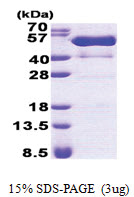PSTPIP1 / CD2BP1 (1-416, His-tag) Human Protein
CAT#: AR50982PU-S
PSTPIP1 / CD2BP1 (1-416, His-tag) human protein, 0.1 mg
Size: 500 ug
|
Need it in bulk or customized? Get a free quote |
CNY 8,900.00
货期*
详询
规格
Specifications
| Product Data | |
| Species | Human |
| Expression Host | E. coli |
| Expression cDNA Clone or AA Sequence |
MGSSHHHHHH SSGLVPRGSH MGSMMPQLQF KDAFWCRDFT AHTGYEVLLQ RLLDGRKMCK DMEELLRQRA QAEERYGKEL VQIARKAGGQ TEINSLRASF DSLKQQMENV GSSHIQLALT LREELRSLEE FRERQKEQRK KYEAVMDRVQ KSKLSLYKKA MESKKTYEQK CRDADDAEQA FERISANGHQ KQVEKSQNKA RQCKDSATEA ERVYRQSIAQ LEKVRAEWEQ EHRTTCEAFQ LQEFDRLTIL RNALWVHSNQ LSMQCVKDDE LYEEVRLTLE GCSIDADIDS FIQAKSTGTE PPAPVPYQNY YDREVTPLTS SPGIQPSCGM IKRFSGLLHG SPKTTSLAAS AASTETLTPT PERNEGVYTA IAVQEIQGNP ASPAQEYRAL YDYTAQNPDE LDLSAGDILE VILEGEDGWW TVERNGQRGF VPGSYLEKL
|
| Tag | His-tag |
| Predicted MW | 50.0 kDa |
| Concentration | lot specific |
| Purity | >90% by SDS - PAGE |
| Buffer | Presentation State: Purified State: Liquid purified protein Buffer System: 20 mM Tris-HCl buffer (pH 8.0) containing 0.15M NaCl, 20% glycerol, 1 mM DTT |
| Preparation | Liquid purified protein |
| Storage | Store undiluted at 2-8°C for one week or (in aliquots) at -20°C to -80°C for longer. Avoid repeated freezing and thawing. |
| Stability | Shelf life: one year from despatch. |
| Reference Data | |
| RefSeq | NP_001308064 |
| Locus ID | 9051 |
| UniProt ID | O43586, O43586-2 |
| Cytogenetics | 15q24.3 |
| Synonyms | CD2BP1; CD2BP1L; CD2BP1S; H-PIP; PAPAS; PSTPIP |
| Summary | This gene encodes a cytoskeletal protein that is highly expressed in hemopoietic tissues. This protein functions via its interaction with several different proteins involved in cytoskeletal organization and inflammatory processes. It binds to the cytoplasmic tail of CD2, an effector of T cell activation and adhesion, downregulating CD2-triggered adhesion. It binds PEST-type protein tyrosine phosphatases (PTP) and directs them to c-Abl kinase to mediate c-Abl dephosphorylation, thereby, regulating c-Abl activity. It also interacts with pyrin, which is found in association with the cytoskeleton in myeloid/monocytic cells and modulates immunoregulatory functions. Mutations in this gene are associated with PAPA (pyogenic sterile arthritis, pyoderma gangrenosum, and acne) syndrome. It is hypothesized that the disease-causing mutations compromise physiologic signaling necessary for the maintenance of a proper inflammatory response. [provided by RefSeq, Mar 2016] |
| Protein Families | Druggable Genome |
| Protein Pathways | NOD-like receptor signaling pathway |
Documents
| FAQs |
| SDS |
其它PSTPIP1产品
Customer
Reviews
Loading...


 United States
United States
 Germany
Germany
 Japan
Japan
 United Kingdom
United Kingdom
 China
China

